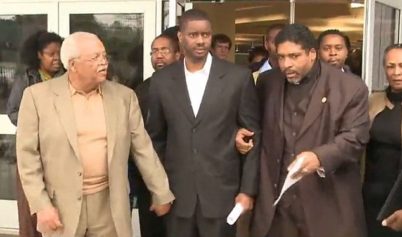
Henry McCollum walks out of prison after being released from Central Prison in Raleigh, N.C. Lawyer fees and high-interest loans are threatening the financial futures of the two North Carolina brothers who have collected hundreds of thousands of dollars for their three decades of wrongful imprisonment. (AP Photo/Michael Biesecker, File)
RALEIGH, N.C. (AP) — When two wrongfully imprisoned brothers were pardoned after 30 years behind bars, they stood to collect hundreds of thousands of dollars in compensation. Now, a federal judge is considering whether too much of their payout is being siphoned away by legal fees and high-interest loans.
A court-appointed advocate for one of the brothers argued in a court filing Wednesday that Henry McCollum and Leon Brown were steered into dubious financial arrangements by lawyers who stand to profit from the men’s lawsuit against the investigators who put them behind bars.
Raymond Tarlton, the court-appointed advocate for McCollum, asked federal Judge Terrence Boyle to rule that McCollum wasn’t competent enough to sign the representation agreement with the men’s current lawyers. The judge is scheduled to hear from the attorneys in person at a hearing on Aug. 9.
“These brothers now have come to federal court to hold to account those who wrongfully convicted them,” Tarlton wrote about the men, who have low IQs. “But the intellectual disability that made them vulnerable to coercion 34 years ago makes them just as vulnerable today.”
Boyle himself has expressed concerns. In May, the judge rejected a settlement that would have allowed the lawyers to claim $400,000 of $1 million in settlements with a town and two of its investigators.
In the same ruling, Boyle appointed Tarlton as a guardian ad-litem, noting his “concern regarding plaintiff McCollum’s competency to proceed for himself in this matter.” A guardian ad-litem can be appointed for children or for adults with reduced mental capacity.
The half-brothers were released from prison in 2014 because of DNA evidence and later pardoned in the 1983 killing of an 11-year-old girl. Their civil lawsuit alleges local and state authorities violated their civil rights.
In his filing Wednesday, Tarlton said the legal fees and interest on loans would leave McCollum with only about $178,000 of his $500,000 share of the proposed settlement with the town of Red Springs.
A separate state wrongful conviction compensation program also awarded McCollum and Brown each $750,000. Yet, Tartlon notes that in the months after receiving the payout, McCollum’s finances had deteriorated to the point that he took out high-interest loans of $50,000 and $15,000 against any future settlements.
Court documents show the interest rate on the loans from Multi Funding USA was 18 percent compounded every six months. Attorney Patrick Megaro signed paperwork acknowledging he had explained each loan contract to McCollum.
Megaro and two other lawyers working with him on the case didn’t respond to an email seeking comment. The legal team began representing the men in 2015 after their release from prison.
Multi Funding USA didn’t respond to messages seeking comment.
Tarlton’s filing indicates that loans also were sought for Brown, but gave no details. Brown has a separate legal guardian arranged by his lawyers and approved by the court.
The men’s lawyers notified the court in April that they had reached a settlement with the town of Red Springs and two of its former investigators. A county sheriff and state agents named as defendants weren’t part of the settlement.
When he rejected the deal, the judge wrote that a settlement could be submitted again after Tarlton got involved. Boyle’s order said Tarlton, who’s also a lawyer, would be paid an unspecified amount out of court costs.
McCollum was 19 and Brown was 15 when Sabrina Buie was killed in rural Robeson County. Defense attorneys have said they were scared teens with low IQs who were berated by investigators and fed details about the crime before they signed fabricated confessions.
The two were initially given death sentences. In 1988, the state Supreme Court threw out their convictions and ordered new trials. McCollum was again sent to death row, while Brown was found guilty of rape and sentenced to life.
But no physical evidence connected them to the crime. A break in the case came after the North Carolina Innocence Inquiry Commission got involved several years ago and had a new DNA analysis conducted on the evidence.


